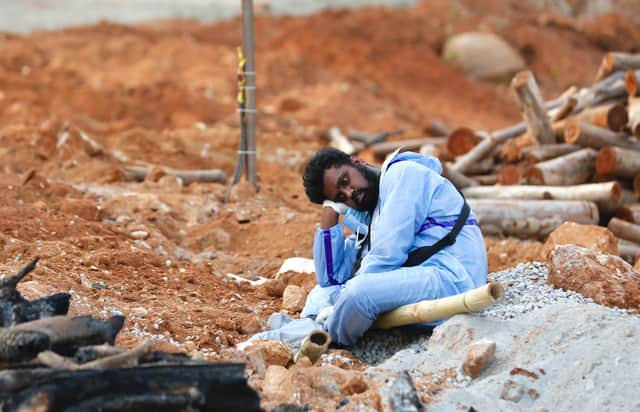Covid crisis in India, the world's largest vaccine-maker, shows the impact of racism and residual colonialism – Dr Gwenetta Curry


Over the last couple weeks, the news has been inundated with devastating images from India as the country’s healthcare system has become completely overwhelmed due to the virus.
India added more than 355,000 cases on Tuesday which is a decrease from the 400,000 new infections recorded on April 30. The hospitals are literally running out of oxygen and having to ration the small supply they have left.
Advertisement
Hide AdAdvertisement
Hide AdFamily members have been forced to watch their loved ones die on the side of the road, waiting for hospital beds. There continues to be very long lines at crematoriums and mass funeral pyres, while cities are running out of space to bury or cremate the dead. As we look on from our somewhat comfortable position in the UK, we must ask ourselves, what is our responsibility to our fellow humans.
India is the world’s largest producer of vaccines including the Oxford AstraZeneca vaccine which originated in the UK. The Serum Institute of India produces 60 per cent of the world’s vaccines each year and now they are struggling to meet the vaccine demands in their own country.
So how can a state working to save the lives of those living in the UK and across the globe not protect its own citizens? The easy answer here is racism and the residual impact of colonialism.
Richer, predominately white, nations are once again benefiting from the labour of Black and Brown people while these populations continue to suffer in their countries. Stripping resources from a country in need is at best unethical and at worst sees these citizens as disposable.
Countries like the US are reaching a position where they have a surplus of vaccines and they should share their resources to protect the lives of those in need.
America has made more progress vaccinating its population than any other nation besides Britain and the experts say that the US is on track to have hundreds of millions of excess doses this year.
As the people of India have come to the aid of the wealthier nations, it is now time to return the favour and send resources to ensure the restoration of their healthcare system and the health of their people.
What does this mean for the rest of the world? Covid has made it abundantly clear that everyone’s health is interconnected, and we will not maintain the health of the UK population without ensuring those around us are also healthy.
Advertisement
Hide AdAdvertisement
Hide AdAs countries begin to reopen for travel, we must remain hyper-vigilant in protecting the health of those around us.
We must never forget that the Covid-19 pandemic started in Wuhan, China, home to only 11 million people, and now the virus has spread to over 154 million people around the world.
We cannot afford to sit around and do nothing whilst other countries suffer. Not only is helping the humane thing to do, it is also the necessary action that needs to be taken to ensure the safety of everyone. Helping India is simply good global health policy.
Dr Gwenetta Curry is an Edinburgh University lecturer on race, ethnicity and health
A message from the Editor:
Thank you for reading this article. We're more reliant on your support than ever as the shift in consumer habits brought about by coronavirus impacts our advertisers.
If you haven't already, please consider supporting our trusted, fact-checked journalism by taking out a digital subscription.
Comments
Want to join the conversation? Please or to comment on this article.
